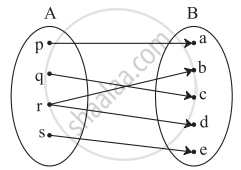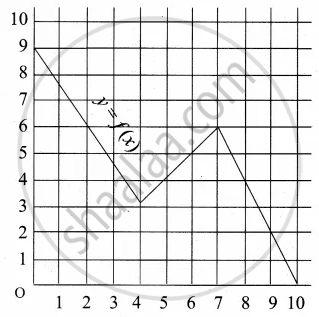Advertisements
Advertisements
प्रश्न
The domain of definition of \[f\left( x \right) = \sqrt{x - 3 - 2\sqrt{x - 4}} - \sqrt{x - 3 + 2\sqrt{x - 4}}\] is
विकल्प
(a) [4, ∞)
(b) (−∞, 4]
(c) (4, ∞)
(d) (−∞, 4)
उत्तर
(a) [4, ∞) \[f\left( x \right) = \sqrt{x - 3 - 2\sqrt{x - 4}} - \sqrt{x - 3 + 2\sqrt{x - 4}}\]
\[\text{ For f(x) to be defined } , x - 4 \geq 0\]
\[ \Rightarrow x - 4 \geq 0\]
\[ \Rightarrow x \geq 4 . . . . (1)\]
\[\text{ Also} , x - 3 - 2\sqrt{x - 4} \geq 0\]
\[ \Rightarrow x - 3 - 2\sqrt{x - 4} \geq 0\]
\[ \Rightarrow x - 3 \geq 2\sqrt{x - 4}\]
\[ \Rightarrow (x - 3 )^2 \geq \left( 2\sqrt{x - 4} \right)^2 \]
\[ \Rightarrow x^2 + 9 - 6x \geq 4\left( x - 4 \right)\]
\[ \Rightarrow x^2 - 10x + 25 \geq 0\]
\[ \Rightarrow (x - 5) {}^2 \geq 0, \text{ which is always true .} \]
\[\text{ Similarly,} x - 3 + 2\sqrt{x - 4} \geq 0 \text{ is always true } . \]
\[\text{ Thus, dom } (f(x)) = [4, \infty )\]
APPEARS IN
संबंधित प्रश्न
Let f and g be two real functions defined by \[f\left( x \right) = \sqrt{x + 1}\] and \[g\left( x \right) = \sqrt{9 - x^2}\] . Then, describe function:
(vi) \[2f - \sqrt{5} g\]
If f, g and h are real functions defined by
Let \[f\left( x \right) = \frac{\alpha x}{x + 1}, x \neq - 1\] . Then write the value of α satisfying f(f(x)) = x for all x ≠ −1.
Write the domain and range of function f(x) given by
Let A = {1, 2, 3} and B = {2, 3, 4}. Then which of the following is a function from A to B?
Which of the following are functions?
If A = {1, 2, 3} and B = {x, y}, then the number of functions that can be defined from A into B is
The range of the function \[f\left( x \right) = \frac{x^2 - x}{x^2 + 2x}\] is
The domain of the function \[f\left( x \right) = \sqrt{\frac{\left( x + 1 \right) \left( x - 3 \right)}{x - 2}}\] is
The domain of definition of the function \[f\left( x \right) = \sqrt{\frac{x - 2}{x + 2}} + \sqrt{\frac{1 - x}{1 + x}}\] is
The range of the function \[f\left( x \right) = \frac{x + 2}{\left| x + 2 \right|}\],x ≠ −2 is
If \[\left[ x \right]^2 - 5\left[ x \right] + 6 = 0\], where [.] denotes the greatest integer function, then
Check if the following relation is function:

If ƒ(m) = m2 − 3m + 1, find f(x + 1)
Which of the following relations are functions? If it is a function determine its domain and range:
{(0, 0), (1, 1), (1, −1), (4, 2), (4, −2), (9, 3), (9, −3), (16, 4), (16, −4)}
Check if the following relation is a function.

Find the domain and range of the following function.
f(x) = `root(3)(x + 1)`
Check the injectivity and surjectivity of the following function.
f : N → N given by f(x) = x2
Check the injectivity and surjectivity of the following function.
f : R → R given by f(x) = x3
Write the following expression as a single logarithm.
ln (x + 2) + ln (x − 2) − 3 ln (x + 5)
Prove that `"b"^(log_"b""a"` = a
Select the correct answer from given alternatives.
If log (5x – 9) – log (x + 3) = log 2 then x = ...............
Select the correct answer from given alternatives.
Let the function f be defined by f(x) = `(2x + 1)/(1 - 3x)` then f–1 (x) is ______.
Answer the following:
Let f : R → R be given by f(x) = x3 + 1 for all x ∈ R. Draw its graph
Answer the following:
Without using log tables, prove that `2/5 < log_10 3 < 1/2`
Let f = {(x, y) | x, y ∈ N and y = 2x} be a relation on N. Find the domain, co-domain and range. Is this relation a function?
Let X = {3, 4, 6, 8}. Determine whether the relation R = {(x, f(x)) | x ∈ X, f(x) = x2 + 1} is a function from X to N?
Given the function f: x → x2 – 5x + 6, evaluate f(2a)
Given the function f: x → x2 – 5x + 6, evaluate f(2)
A graph representing the function f(x) is given in it is clear that f(9) = 2

Describe the following Range
The data in the adjacent table depicts the length of a person's forehand and their corresponding height. Based on this data, a student finds a relationship between the height (y) and the forehand length (x) as y = ax + b, where a, b are constant.
| Length ‘x’ of forehand (in cm) |
Height 'y' (in inches) |
| 35 | 56 |
| 45 | 65 |
| 50 | 69.5 |
| 55 | 74 |
Check if this relation is a function
The function f and g are defined by f(x) = 6x + 8; g(x) = `(x - 2)/3`
Write an expression for gf(x) in its simplest form
Let f(x) = `sqrt(x)` and g(x) = x be two functions defined in the domain R+ ∪ {0}. Find (fg)(x)
The function f: R `rightarrow` R defined by f(x) = sin x is ______.
Which of the following functions is NOT one-one?
